With so much of information and diet trends out there; high fat, low carb, high carb, intermittent fasting and more, it’s no wonder that we can get confused with the “right” way of eating. In this video, I’m going to share with you the 5 Biggest Dieting Myths on Weight Loss, by looking beyond opinions and focusing on the science.
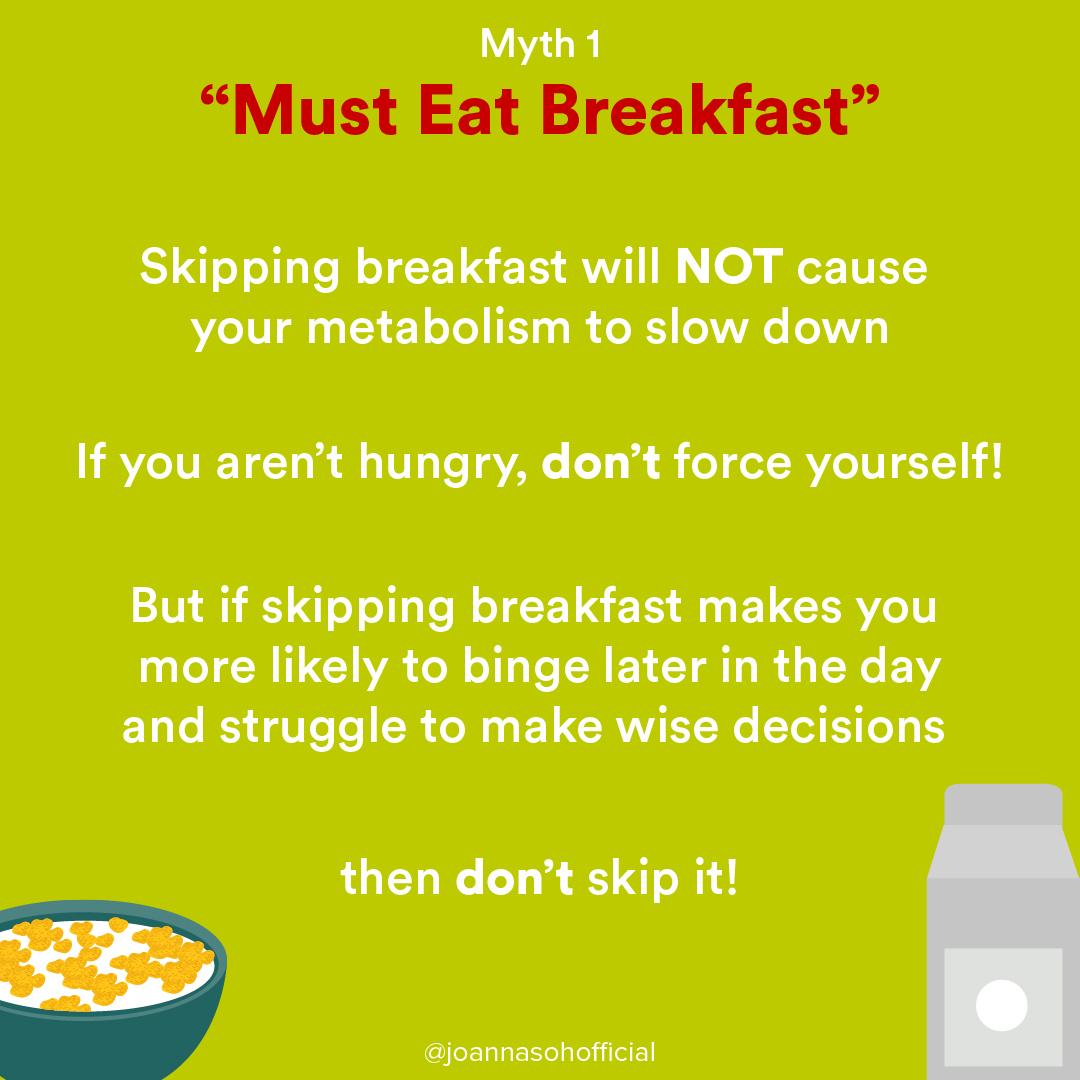
1) Must Eat Breakfast
I’m sure we’ve heard that eating breakfast will make you less likely to binge during lunch, in fact, I myself have said this in my previous videos. This is not an untrue claim by any means.
However, skipping breakfast will not cause your metabolism to slow down. Skipping breakfast can still help with weight loss especially for those who are practicing intermittent fasting.
The bottom line is if skipping breakfast makes you more likely to binge later in the day on unhealthy snacks because you are extremely hungry and struggle to make wise decisions, then don’t skip it. However, if you genuinely are not hungry, you don’t have to force yourself to eat breakfast.
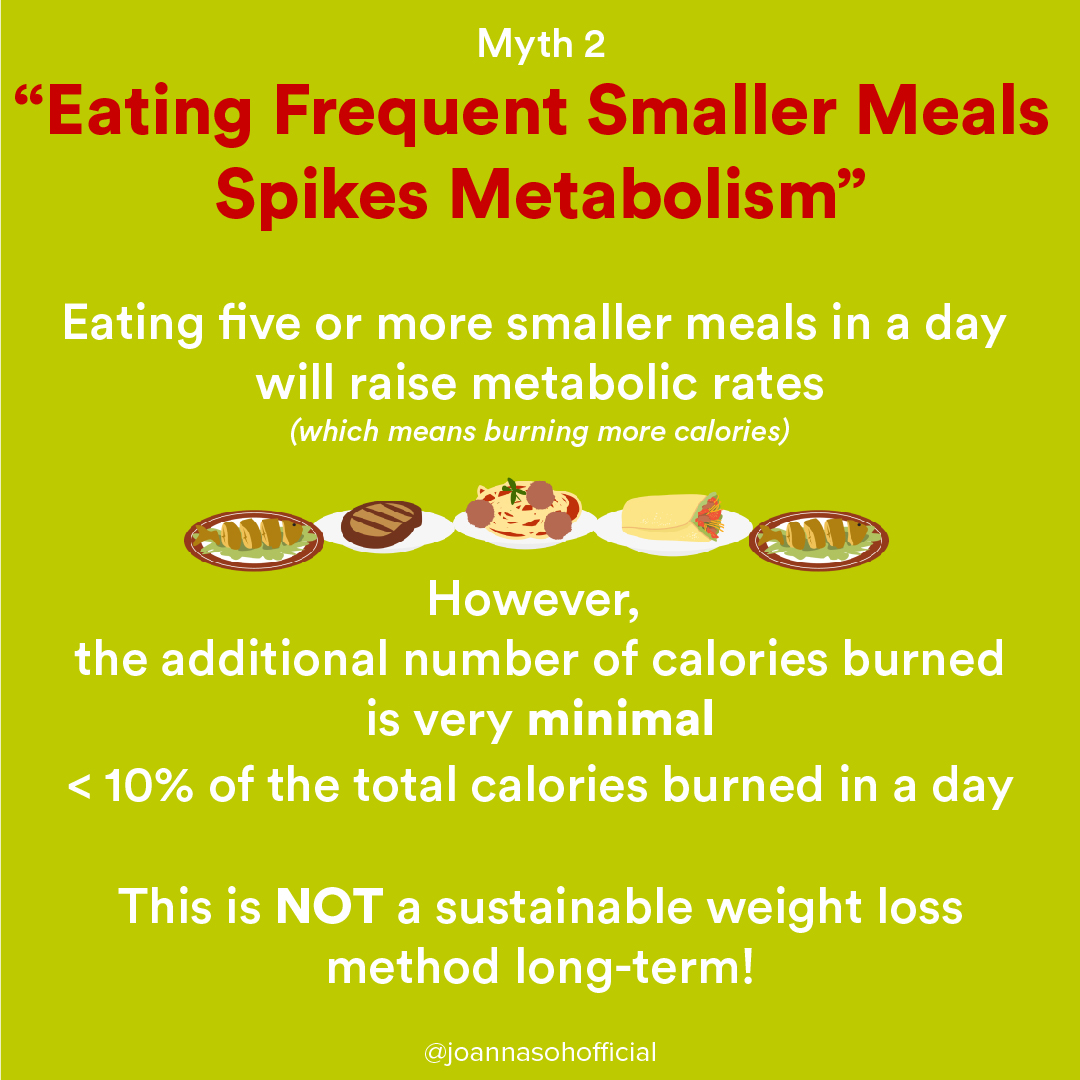
2) Eating Frequent Smaller Meals Spikes Metabolism
This myth proposes that eating five or more smaller meals in a day will raise metabolic rates, which means burning more calories. It is true that when you eat, you increase your metabolic rate slightly by increasing the thermic effect of food, that is, calories burned from consuming food.
However, the additional number of calories burned is very minimal, at less than 10% of the total amount of calories you burn in a day. This means, your food intake frequency has a negligible effect on metabolism to help you lose weight long term.
If you want to lose weight and sustain a healthy weight long term, eating more frequently isn’t the most reliable method. If you genuinely like eating smaller, more frequent meals, then go for it, but don’t force yourself to eat more meals in hopes of losing weight. Some of you could end up consuming more calories, which, as we all know, will lead to weight gain.
What affects your basal metabolic rate the most is your body composition. The more lean muscles you have, the more calories you’re burning at rest.
A pound of fat-free tissue burns about 14 calories a day, while a pound of fat burns just 2 - 3 calories. While the difference may not sound a lot, it will have a significant effect over time. So focus on increasing more lean muscles by including strength training exercises into your routine.
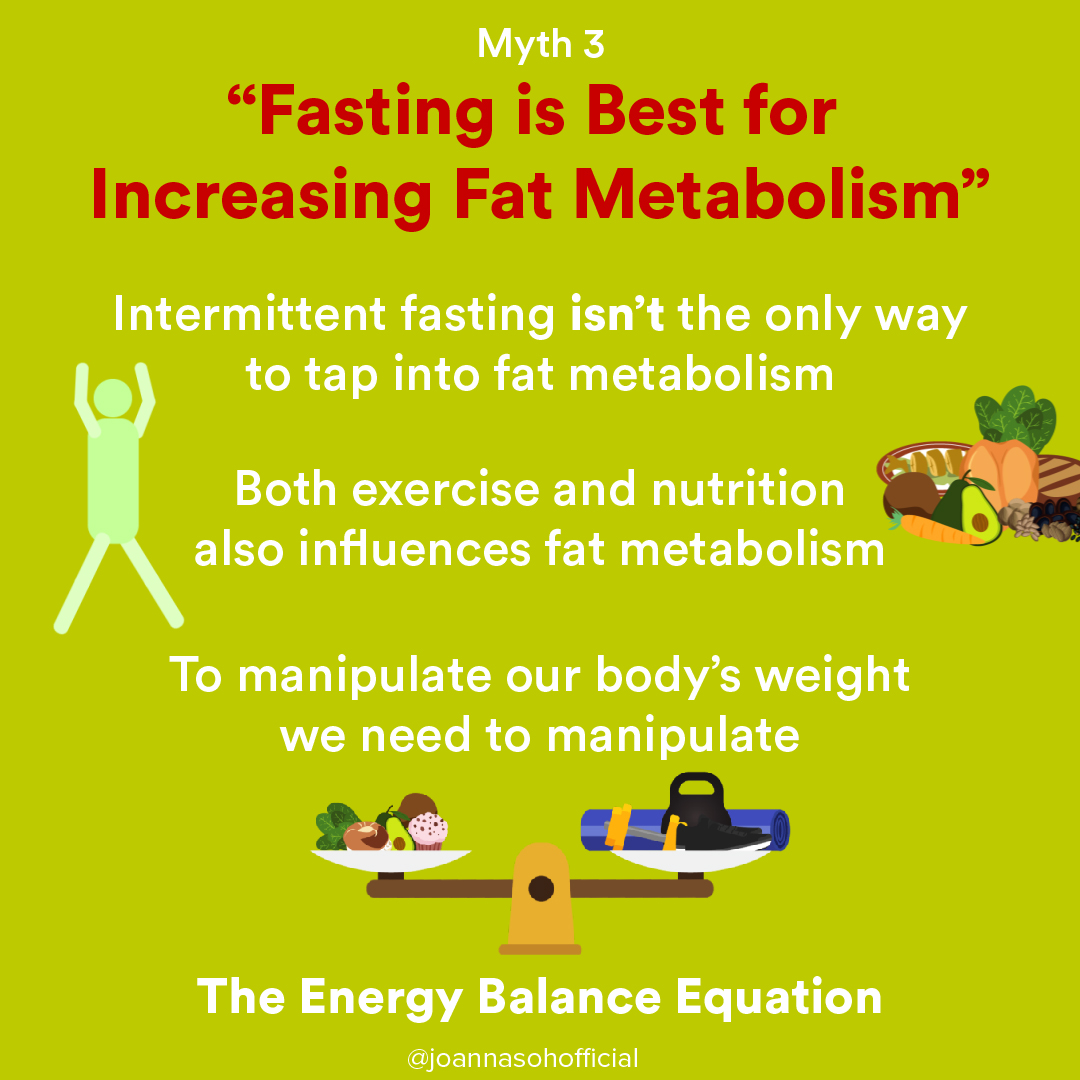
3) Fasting is Best for Increasing Fat Metabolism
Intermittent fasting has a growing following and I’m sure some of you might be on this eating pattern too.
For those of who who might be new to this, Intermittent Fasting is the practice of consuming no or very few calories for a time period that can range between 12 - 16 hours, and limiting their feeding window to between 8 - 12 hours.
This has been said to be effective for overweight adults because of the fat metabolism benefits that kick in as the body switches to fat as a source of fuel, which occurs after about 12 hours of fasting.
Saying that however, intermittent fasting isn’t the only way to tap into fat metabolism. Caloric restriction has been shown time and time again to increase fat metabolism, especially when combined with exercise. Both exercise and nutrition influence fat metabolism. For some individuals, exercising while fasting can be a huge challenge and this can result in a decrease of cognitive function and physical performance.
The bottom line is, to manipulate our body’s weight up or down, we need to manipulate the energy balance equation. Both calorie restriction and fasting can considerably reduce calorie intake and bring about similar health benefits. They are like siblings in a way, because studies on fasting initially emerged from the work on calorie restriction.
What’s most important when it comes to weight loss is to follow sustainable lifestyle habits. If intermittent fasting works for you, then great, but if you are forcing yourself to follow this eating pattern but unable to sustain it long term, then you must find an eating pattern that works for you.
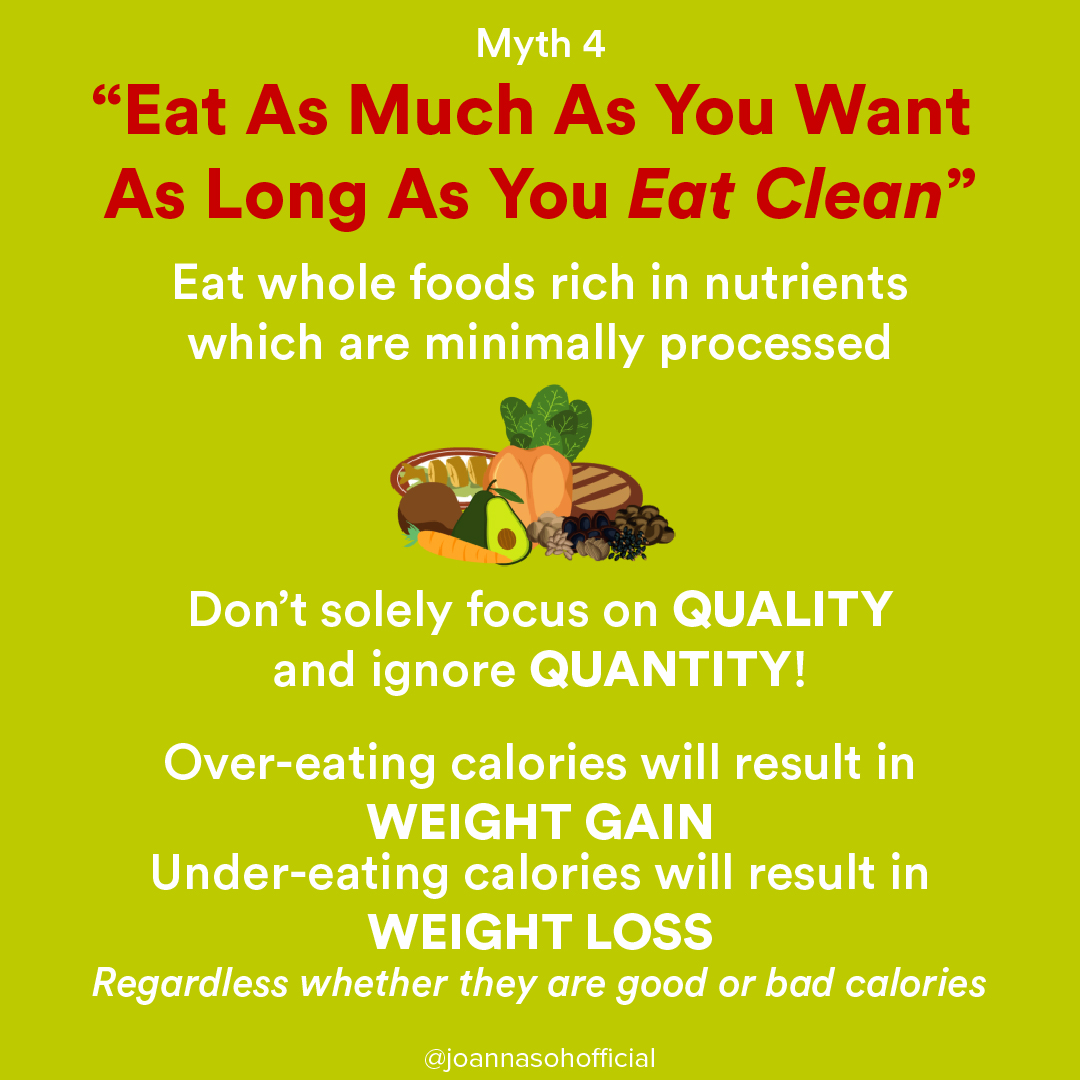
4) Eat as much as you want as long as you are eating clean
I’m sure you’ve come across this common phrase “eat clean”. What does it mean? Eating clean means eating whole foods rich in nutrients, which are minimally processed. YES. All of us should strive to eat clean. The issue comes when they solely focus on quality and ignore quantity.
It’s all about consumption. Overeating calories will result in weight gain and under-eating calories will result in weight loss, regardless whether it’s good or bad calories. Does this mean that if you watch your calories, you can consume processed food and still lose weight? Yes and no, because not all calories are created equal.
If you consume more good calories, you’ll be feeding your body with essential vitamins and minerals, have more energy, feel satisfied, hence eating less and improving your overall state of health.
If you have a diet filled with bad calories, you’ll suffer from lack of energy, poor health, your body will be lacking the vital vitamins and minerals it needs to perform at its optimum and you’ll crave for more bad foods.
The bottom line is aim to eat clean while being conscious of how many total calories you are consuming in a day. This leads on to my final myth.
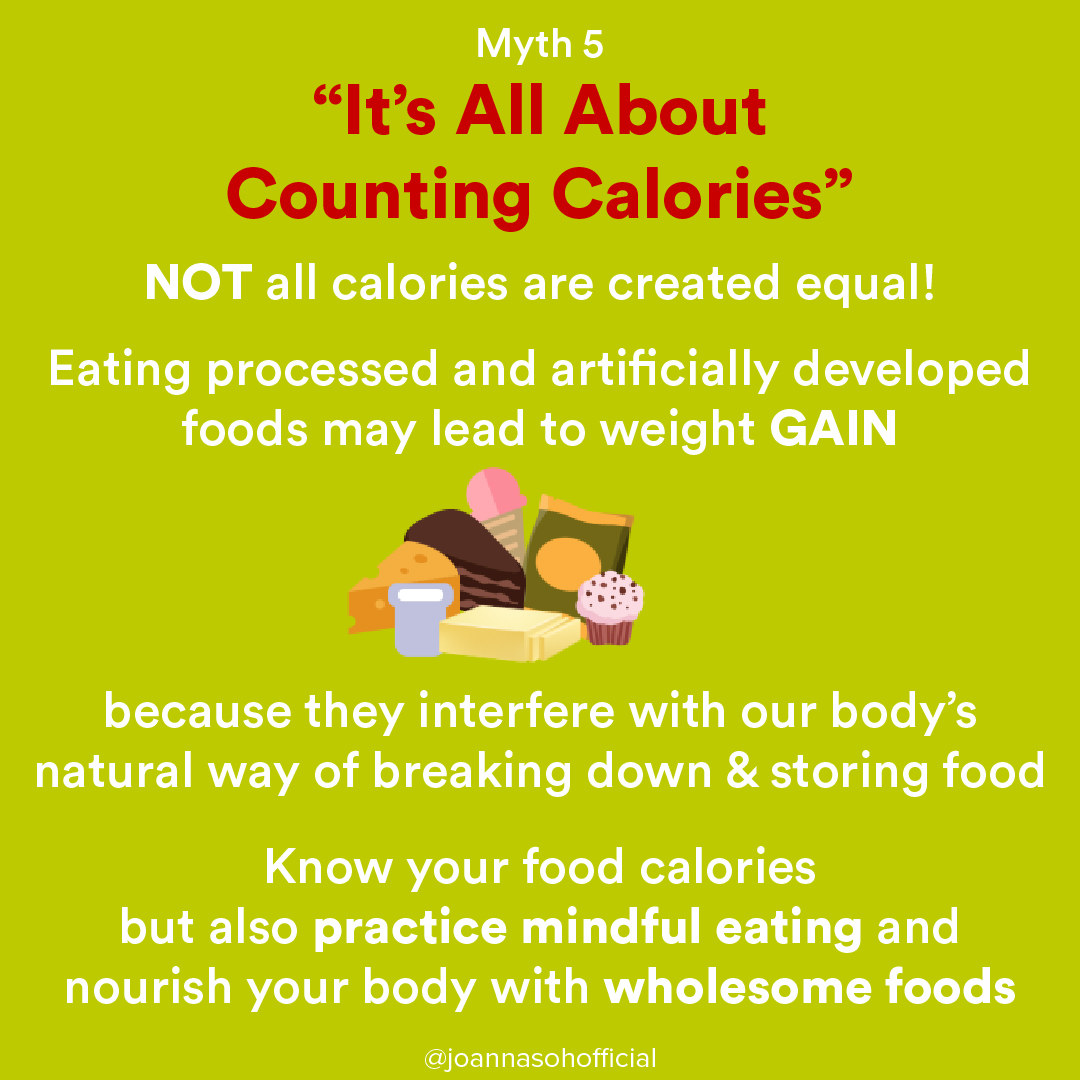
5) It’s all about counting calories
Yes, counting calories and limiting your daily calorie intake will lead to weight loss. But let me ask you this: are you prepared to count calories and control what you eat forever? Let’s be real and ask yourself, how long can you stick to a strict regime, weighing out your food, counting every single nut, having no social life by avoiding eating out or at your friends’ house because you’re trying to maintain that strict regime? This sounds really depressing!
Also, as I’ve mentioned before NOT all calories are created equal! You may think that you can drink diet sodas all day long because they contain zero calories, but know this, they will cause damage to your body, your metabolism and your gut microbes long term. Eating processed and artificially developed low-calorie foods can actually lead to weight gain, because they interfere with our body’s natural way of breaking down and storing food.
Yes, it’s important for you to have knowledge and the basics in regards to food calories, but at the same time, not being overly obsessed with every single calorie you eat, because long term, you could develop an unhealthy relationship with food.
Another piece of advice is to not starve yourself and cut calories drastically. This is unhealthy and not sustainable. If you want to lose weight and keep it off forever, you need a modest calorie restriction that you simply continue and never stop.
The bottom line is, it’s not one or the other. Yes, be aware and know the calories in food, at the same time, practice mindful eating and nourish your body with wholesome clean food.
So which are you? Are you a breakfast person? Do you prefer having more small meals or fasting and eating big meals? Whatever your eating preference is, remember this, all dietary patterns should be derived from one simple principle, which is, energy balance. Overeating calories will result in weight gain and under-eating calories will result in weight loss, regardless of the time you eat in the day or the source of calories.



